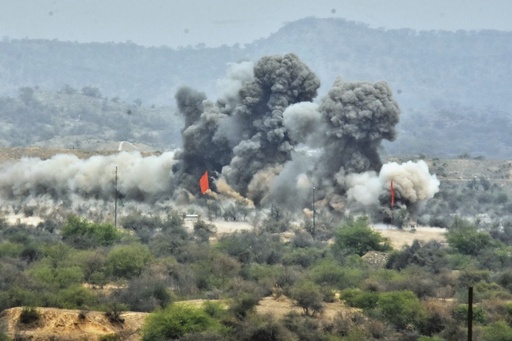NEW DELHI – In an attempt to alleviate the heightened tensions following the recent deadly incident in Kashmir, U.S. Secretary of State Marco Rubio reached out to key representatives in both India and Pakistan, according to the State Department.
Rubio held discussions with Pakistan’s Prime Minister Shehbaz Sharif and India’s Foreign Minister Subrahmanyam Jaishankar, urging both nations to step back from the brink and reduce tensions this Wednesday.
The conflict started after India accused Pakistan of supporting the attack, a charge Pakistan has vigorously denied. As the situation escalated, both countries took aggressive diplomatic moves, expelling each other’s diplomats and citizens, shutting down border crossings, and closing their airspaces mutually. India even moved to suspend an essential water-sharing agreement with Pakistan.
Exchanges of gunfire have been reported along the de facto border, pushing the hostility between the nuclear-armed adversaries to unprecedented levels in recent times.
The contentious region of Kashmir is divided between the two countries, with both laying claim to it entirely. Historically, India and Pakistan have waged wars twice and engaged in a limited conflict over this strategically significant territory.
Tammy Bruce, spokesperson for the U.S. State Department, conveyed that in his talks with Jaishankar, Rubio expressed his condolences for the attack’s victims and reiterated the United States’ commitment to collaborating with India in combatting terrorism.
On Thursday, Jaishankar recounted his dialogue with Rubio about the massacre in Pahalgam, a town in Indian-administered Kashmir, where 26 tourists, predominantly Hindu, lost their lives. Jaishankar emphasized that those responsible for orchestrating and supporting the attack need to face justice.
Rubio also engaged in a conversation with Sharif later on Wednesday, underscoring the importance of both India and Pakistan working collectively towards securing peace in South Asia, as per a Pakistani government statement. Sharif rejected the accusations from India during the interaction and urged the U.S. to encourage India to tread responsibly and lower its aggressive rhetoric.
In a related gesture, U.S. Defense Secretary Pete Hegseth called his Indian counterpart Rajnath Singh on Thursday, offering condolences for the attack’s casualties while affirming India’s right to self-defense, Singh’s office noted on the social media platform X.
Additionally, Qatar’s emir, Sheikh Tamim bin Hamad Al Thani, reached out to Sharif, expressing Qatar’s intention to collaborate with Pakistan to ensure a de-escalation of the ongoing crisis, according to another statement from the Pakistani government. Sharif further denied India’s linkages of Pakistan to the violent episode and showed willingness to join a credible international investigation into the matter.
The attack has stirred outrage across India, where Prime Minister Narendra Modi has passionately vowed to hunt down those responsible. Meanwhile, a Pakistani official claimed that India might be preparing for an attack in the coming days, based on credible intelligence.
Military preparations in Pakistan continue, as demonstrated by Army Chief Gen. Asim Munir overseeing a military exercise in the eastern Punjab province. The operation was reportedly designed to reinforce combat preparedness and weapon integration amid battlefield-like conditions. Gen. Munir emphasized that any Indian military adventurism would meet with a rigorous response, reaffirming Pakistan’s commitment to maintaining regional peace while being absolutely prepared to protect its national interests.
In the past nights, both Indian and Pakistani forces have reportedly exchanged fire, each accusing the other of initiating hostilities. The Indian army noted on Thursday that it returned fire from what it described as “unprovoked” small arms fire by Pakistan in several sectors within Indian-controlled Kashmir. Conversely, Pakistani state media reported ceasefire violations by Indian forces involving heavy weaponry along the contentious Line of Control. These incidents have not been independently confirmed.
Historically, the two nations have frequently blamed each other for starting such border skirmishes in the volatile Himalayan region.



